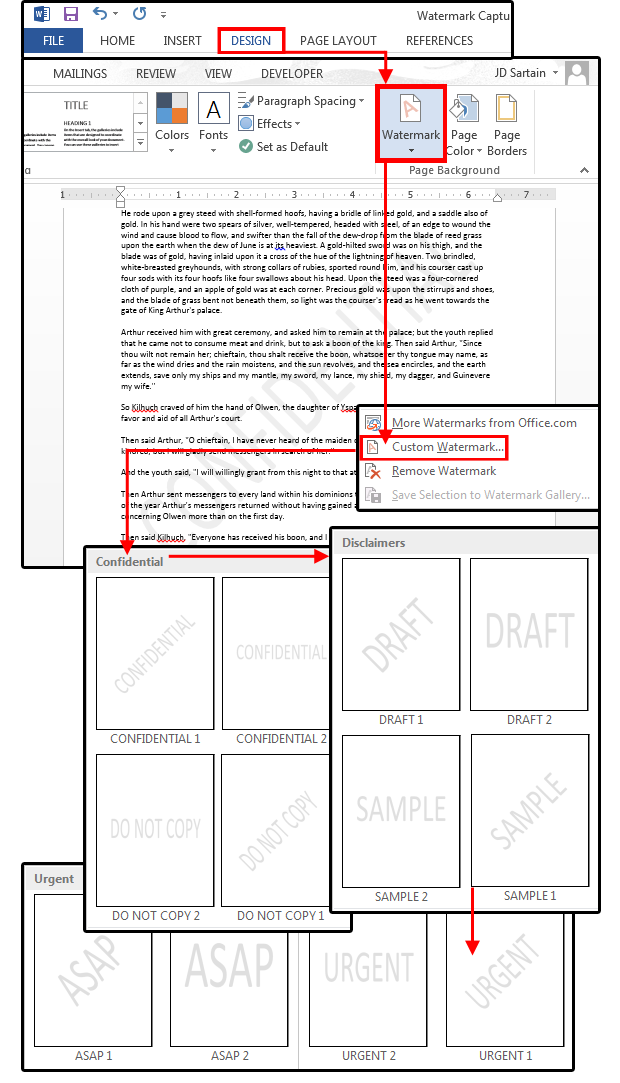The Create New AutoText box opens. Next to Name, type a name for your signature block and click OK. When you want to use this signature, place the insertion point where you want to. Date and time stamps may just be one of the most underrated things in a document. We tend to overlook when a letter or statement was written and pay more close attention to when it was sent.
Hi Jim, I know of none. That does not mean that there are not any. Your tests are the first that I have heard about on this subject. They tell me that something might be possible. In the meantime, I would suggest posting the following prominently. Working on a document from within Word on a flashdrive is recently the number one way of corrupting the document and losing your work!
Word just does not play well with flashdrives. When using Word, pretend that your flashdrive does not exist.
Do not: - Open a document on a flashdrive from within Word. Copy to hard drive and open from there. - Print a document that is on a flashdrive. - Save, from within Word, a document to a flash drive.
(The second biggest cause of losing work is opening a document directly from an email, editing and saving without specifying a location. It gets saved as a temporary file.) //////////////////////////////////////////////////////// I hope this information helps. Please let me know if you have any more questions or require further help. Download messages from iphone to mac for free. Regards Please mark helpful or answered as appropriate to help other users.
Charles Kenyon Attorney at Law Madison, Wisconsin wordfaq[at]addbalance[dot]com http://addbalance.com/usersguide/styles.htm. Thanks for the reply. We tell them over and again not to rely on USBs as they can be wiped so easily or, even worse, lost or left plugged in, but they only listen after they've had issues. Macs are even worse.

You can remove a flashdrive from PC (pretty) safely as long as there's no cached writes going on. In most cases if you pull a USB from a Mac it will become unreadable in all cases unless the correct settings have been applied.
We also advise them about the issue with making sure they download from email before updating because they're working on a temporary copy (we've had users in fits of tears where they'd been working on their dissertations for several hours on hand-in day, clicked save over and again, popped out for lunch then discovered their changes lost) but most of the mail providers now make you save before you can edit (but we still get users downloading documents to the local drive then wondering why they can't access it on other PCs!). Your experiments are interesting but mostly confirm the advice that we (and you) regularly give: It's okay to store a file on a USB flash drive for mobility, but you should never open a Word file directly from the drive or save directly to it. Always save to the local drive and then, when you're done, copy/send to the flash drive.
Nowadays, USB drives have such large capacity that overfilling is not such an issue (premature withdrawal still is), but it is a fact that Word creates many temporary files in the active folder. If you have copied/pasted material, a.wrl file is created every time you save (in addition to any.wbk file that may be created and overwritten). All of these are deleted when you close the document, but of course if you remove the drive before closing the document, they remain on the drive. Microsoft MVP (Word) since 1999 Fairhope, Alabama USA http://ssbarnhill.com. This does line up with what we say, but it doesn't explain why we've had a small but significant number of users who have experienced similar issues - working on a file for a significant period, hitting save, ejecting the USB, discovering changes have not been saved for several hours then we do a file recovery and find there's say 20, 30+ apparently discarded copies of the file on the USB in.DOCX format between the initial time of opening and logging off.
Mozilla firefox for mac on the launcher. Firefox won't open on Mac despite trying everything I've read. * Control-click on the Firefox Dock icon and uncheck 'Open at Login' * Click Accounts (in the System row of the System Preferences window) ** Click the Login Items tab ** Click on Firefox in the list ** Click the Minus (-) button.
This is very worrying. We have a couple of thousand students through the doors of the library every day during the academic year.
We only have a few dozen during the summer break and we've suddenly had a spike. In October we'd expect 10-15,000 users a week, so even a 1% chance of an issue would present a massive problem for us. We can advise users not to rely on USBs but during Freshers Week and induction their schools, local companies, etc. Give them away as promo items and they've often been out and bought one when they've visited the stationary shop for their pads, pens, etc. We'd be interested to hear from a technical person about this. The fact it's being saved under user name/date and time stamp/version number makes me think that there's a process somewhere that's deliberately discarding a copy every time you hit save then creating a new one. That is, in fact, the way Word saves files. According to: A simplified view of the scheme used to save an edited file Create temp file Create ~wrdxxxx.tmp Write temp file Save example data to ~wrdxxxx.tmp Delete original file Delete EXAMPLE.DOC Move temp to target name Move ~wrdxxxx.tmp to Example.doc Word gains significant performance speed by placing the temporary file in the same directory as the saved file.